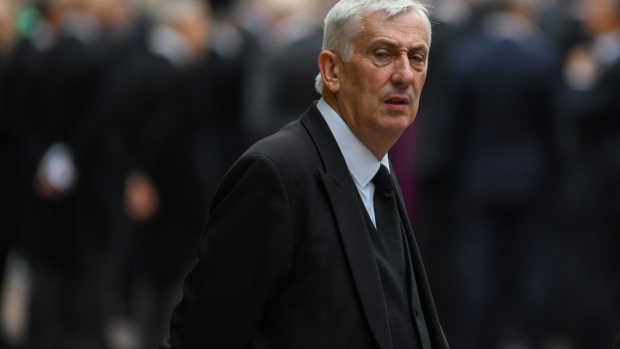Feb 21, 2024
UK’s House of Commons Descends Into Chaos Over Vote on Gaza Ceasefire
, Bloomberg News

(Bloomberg) -- A vote on the Israel-Hamas war triggered chaos in the UK’s House of Commons with the Scottish National Party walking out in protest and Prime Minister Rishi Sunak’s Conservatives also refusing to cast their ballots.
The disarray was triggered after Speaker Lindsay Hoyle controversially allowed both Keir Starmer’s Labour Party and Sunak’s Tories to propose changes to the SNP’s call for a cease-fire in Gaza. The differences between the three parties are marginal — all want an end to the fighting but with different caveats applied — yet some MPs were furious at a procedural shift they saw as favoring Labour.
Hoyle’s move meant Starmer avoided what threatened to be a destabilizing rebellion by members of his party, because it meant his MPs could back his carefully chosen wording rather than language put forward by the SNP.
Starmer has been battling to keep his party united since Hamas’s attacks in October, as he tries to balance Labour’s traditionally strong support among British Muslims with a push to shed accusations of antisemitism under his predecessor and present his party as a government-in-waiting. Labour has a 20-point lead in polls ahead of a UK election expected later this year.
But while his call for an “immediate humanitarian cease-fire” was ultimately passed by the Commons, the events late Wednesday in the chamber meant the Labour leader won’t be celebrating. Instead, Conservative and SNP MPs roared accusations that Hoyle acted to spare Starmer’s blushes.
“I thought I was doing the right thing and the best thing, and I regret it, and I apologize for how it’s ended up,” Hoyle told the House of Commons, amid calls from some SNP MPs for him to resign.
As is often the case in Westminster, the furor over an arcane rule or convention that wasn’t followed also masked a deeper political motive.
A similar vote brought to Parliament in November by the SNP — which is trying to fend off a resurgent Labour in Scotland ahead of the UK election — triggered a Labour rebellion that undermined Starmer’s position.
So ahead of Wednesday’s follow-up vote, there was intense pressure on him to come up with a form of words that would keep his MPs onside. The solution was to call for an immediate cease-fire in Gaza, while also calling for hostages held by Hamas to be released and for the peace process to be revived.
The flaw was that Starmer’s motion might not be put to a vote, under a convention that opposition parties cannot try to amend a proposal put forward by another opposition party if the government also tries to do so. It was the perfect scenario for the SNP and Conservatives trying to put Labour in a bind, because it meant Labour MPs who wanted to express their wishes for a cease-fire would have had to side with one of their positions. Until Hoyle stepped in.
Instead of a straight vote on the SNP’s position, the Speaker said MPs would first come to a decision on Starmer’s. In simple terms, that meant that if the House of Commons voted for Labour’s position, that would supersede the SNP’s chance to test support for its own. It was a spat with huge political consequences that hinged on the order of the votes.
Hoyle said he intervened to allow MPs to consider “the widest possible range of options.” He also referred to security threats facing MPs from constituents.
But the SNP was furious. The party’s leader in Westminster, Stephen Flynn, accused Hoyle of handing its allotted day in Parliament to Labour. “I will take significant convincing that your position is not now intolerable,” he said.
By refusing to take part, Sunak’s Conservatives also avoided the scenario where they would have to vote against a cease-fire — whether Labour’s version or the SNP’s — to avoid supporting an opposition party, despite the fact that many Tory MPs expressed their desire to see an end to the fighting.
Labour’s shadow Commons leader, Lucy Powell, accused the government of pulling its own motion because the Conservatives didn’t have the numbers present to pass it.
“Last time I looked, the government benches had a majority in this House,” she said. “So perhaps we have to ask the question whether or not they do still command a majority in this House this evening, or whether they are trying to hide behind some other reason?”
Starmer’s decision to explicitly call for an immediate cease-fire for the first time this week — in contrast to his previous call for a “sustainable” cease-fire — is a slightly different emphasis compared to the government’s position, which was to call for an “immediate humanitarian pause.”
“This is a moment when the whole House can come together,” Labour’s shadow foreign secretary David Lammy had told MPs. “Let us be clear, whether from the government benches or the opposition benches, that we all agree that the time for a cease-fire has come, to end the bloodshed and suffering, and to allow a sustained effort to salvage the hope of a two-state solution.”
Yet in the UK’s pre-election politics, the smallest differences are opportunities for point-scoring, which is why during the debate on a non-binding vote on a cease-fire, some MPs lamented the bigger picture was completely overlooked.
The focus “must be on the bloodshed and slaughter in both Israel and Gaza,” SNP MP Patricia Gibson said. “Some of the antics, games and name-calling we have seen today in this chamber paint this chamber in an unedifying light.”
The votes came days after Israel warned it could launch an offensive in the Rafah area of Gaza — where some 1.5 million Palestinian people are sheltering — next month unless all hostages are released. Lammy said this would be a “humanitarian disaster, a moral catastrophe and a strategic mistake.”
(Updates with comment from Labour’s Powell in 15th paragraph)
©2024 Bloomberg L.P.








